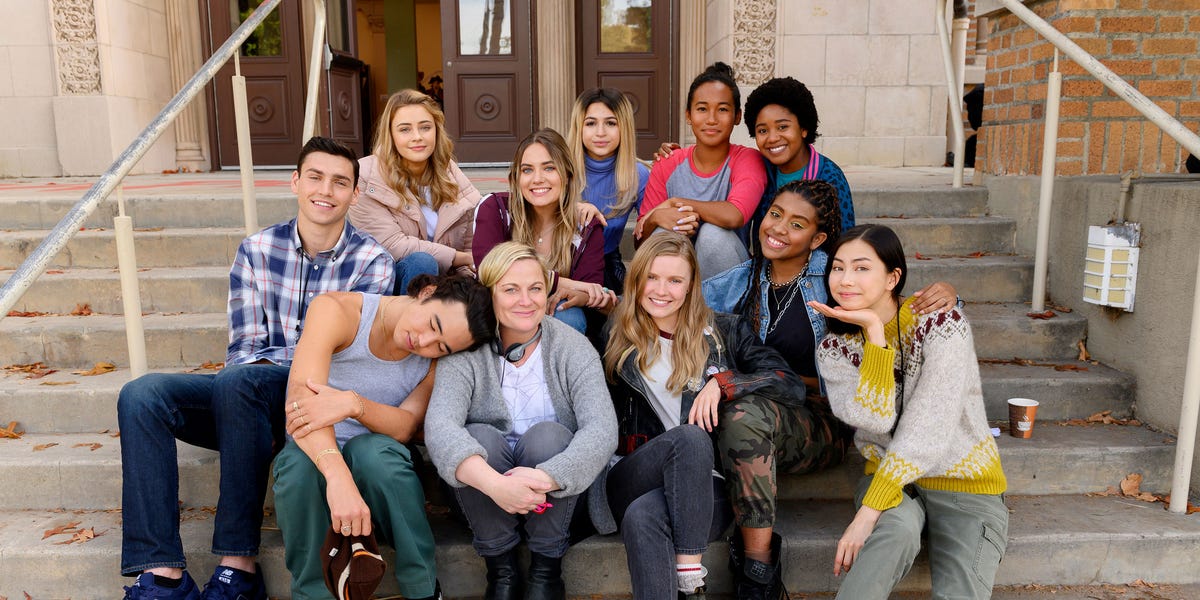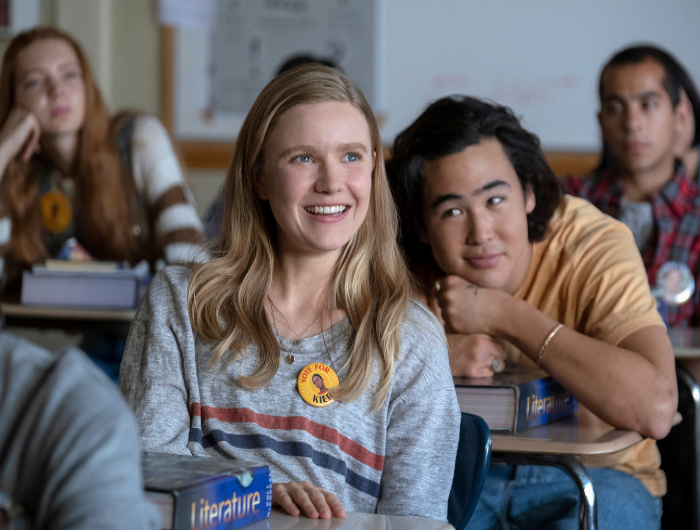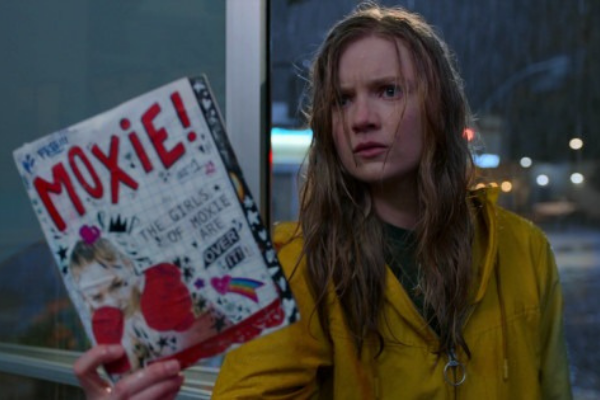The trailer for Amy Poehler’s new film ‘Moxie’ debuted last month to much hype and excitement among young women. Incendiary, rebellious and inherently female, it roused a rallying cry and found an eager audience awaiting its arrival on Netflix.
The story is set in a high school in the U.S., which is positioned as a breeding ground for misogyny and rape culture, as we learn that a list is published each year of the girls in the school, with categories like ‘Most bangable’, ‘Best ass’ and ‘Best rack’. Girls are sent home by the apathetic administration for wearing tank tops, although it’s the boys that are sexualising them, with the likes of the captain of the football team, Mitchell Wilson, parading around the school unchallenged for his harassing and aggressive sexual advances on many of the female characters.

Based on the book by Jennifer Mathieu, we see this world through the eyes of quiet Viviane, who goes mostly unnoticed, content to blend into the background, until she is ranked ‘most obedient’ when the list is published. We feel the insult ourselves, we shudder at the implications of it when ranked alongside all these sexual assets and we feel her rage when it sparks her urge to fight back but she feels helpless in the face of the school system that always supports the male athletic student body. Rooting through her mother’s old resources from her revolutionary feminist protests back when she was in school, Viviane is inspired to be disobedient, creating ‘Moxie’, a pamphlet that calls out the injustices against the female students in her school.
What starts as something created from a moment of rage quickly catches on, spreading like wildfire through the school at the allegations made in the magazine, with everyone wondering who the Moxie creator could possibly be. As things begin to change, but everything spirals out of control, Viviane and the girls who have gathered around the cause watch as the system scrambles to right itself when the boat is rocked by their assertions that what is happening is not permissible.

There are powerful moments in this film. It's a refreshing, young look at the roots of why it isn't just 'boys being boys', at why the system will always want as little mess to clean up as possible, why feminism needs to be intersectional and how there is power in girl's unifying, not being made adversaries by the value that men assign to us. And in many ways, Viviane gets to live out lots of girl’s and women’s fantasies – standing up for yourself without fear, telling them off for their behaviour and having it actually make a difference. Mitchell Wilson is a caricature, the supremely evil and sexual high school boy that is an easy foe to dislike – it’s a teen movie, the lines have to be black and white. But what would have been more interesting to see is not the obvious take-down of the clearly bad-guy type, but instead to perhaps have a focus on his friends, who don’t participate in the same awful behaviour but don’t stop it either.
When Lucy, one of the Moxie girls, complains to the school head that Mitchell is harassing her and that she doesn't feel safe, the administrator replies with 'He's bothering you?' to which Lucy replies, 'No, he's harassing me.' and while it's supposed to be an entertaining moment when the administrator replies:
'Oh, there's that word! If you use that word, that means I have to do a bunch of stuff. But if he's bothering you, and that's what it sounds like to me, then we can actually have a conversation. I am aware that outside these walls, the world is experiencing a tornado, and that in response, young people, especially girls, are expressing their discontent about everything in every direction. But we have to be clear about things before we move forward.'
Behind her, a poster of Mitchell Wilson beams, with the words 'School Pride' written below.

This movie is a good outlet for the rage at how ineffectual women can feel against a system that does not protect them. It’s an exciting representation of female power that is diverse and refreshingly dorky, non-sexualised and just straight up angry. There is no tiptoeing here. Though Viviane hides behind Moxie, the girls around her do not, which is why I kept waiting for the story to be about them.
Viviane: 'Look, I just wanted to say, ignore Mitchell.
Lucy: 'Why should I have to ignore him? Why can't he just not be a dick?'
Viviane: 'He's an idiot, he has been since second grade.'
Lucy: 'He's dangerous.'
Viviane: 'I don't think he's dangerous, I think he's just annoying.'
Lucy: 'You know annoying can be more than just annoying, right? Like it can be code for worse stuff?'
Viviane: 'If you keep your head down, he'll move on and bother somebody else.'
Lucy: 'Thanks for the advice. But I'm gonna keep my head up, high.'
There were so many interesting stories around Viviane; Lucy, the new girl who challenged Mitchell before anyone else had the guts to, Claudia, the daughter of an immigrant who risks everything by participating in the protests but does it anyway, Kiera, the championship-winning captain of the girl's soccer team who doesn’t even get a look in at the sports scholarships because Mitchell automatically gets them as quarterback. Lucy, who is fascinating and full ideas about how to change the outdated curriculum, who advocates for Kiera’s talent to be taken seriously, who organises an entire movement in the school off the back of the momentum that Moxie creates. I think a lot of us appreciate Viviane’s quiet revolution, but that’s a story we’ve heard before. Lucy is loud and uncowed by Mitchell’s aggression – and we wonder why the story doesn’t centre on her at times.

This movie gets a lot right, particularly about the male dialogue that opens up any time the female narrative meets their aggression with its own. Mitchell trivialises the aggression he’s perpetuating by telling the girls ‘You know there’s real problems in the world, right?’. The film looks into issues of defamation as he attempts to turn the girl’s assertions into bullying and it rings worryingly true in a post #MeToo world. There are plenty of bad and irresponsible decisions made by Viviane, but the line between destructive and productive revolution remains unclear here in many places. Her personal storyline sometimes complicates the overall plot of rebellion and that can make for confusing moments where we're not sure if we do support all the actions of the group.
So while some of this film is certainly performative in places, there are lots of worthwhile moments of channelling anger and challenging the frustrating lack of change. Quirky, offbeat and entertaining, the characters are vivid – though there are some we would have liked to have seen more from – and the ending is decisive and a conclusion we can all hope will become the reality of our world someday.








